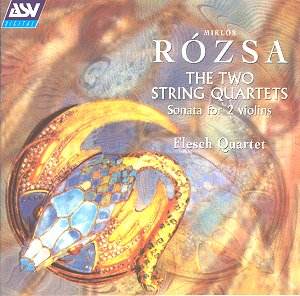String Quartet No.1, op.22, String Quartet No.2, op.38, Sonata for 2 violins, op.15a
As his autobiography, A Double Life, tell us, Miklós Rózsa was a serious young Hungarian composer with various works to his name when in the mid-1930's he discovered he could make a living by writing music for the cinema. As the title of his book suggests, he maintained his career as a 'classical' composer whilst becoming one of the most successful and celebrated film composers of Hollywood's "Golden Age". Uniquely, his contract with MGM allowed for him to have three months break each summer to write his own music, something he did in his Italian retreat far from Hollywood.
Written in 1950, the String Quartet No.1, opus 22 is dedicated to Peter Ustinov, with whom Rózsa became friends while working on Quo Vadis (1950); the first of the historical epics with which, culminating in Ben-Hur, King of Kings and El Cid the composer would find his greatest fame. However, aficionados of Rózsa's grand film style seeking something similar here will be disappointed. It is almost as if the composer chose the pure intimacy of the string quartet as a reaction against the full orchestra and choir of MGM's epic. As the excellent booklet notes by Brendan G. Carroll put it, "The musical language is taut and highly concentrated and the ghost of Bartók hovers not just over the atmosphere of the piece but in its linear form as well." Nevertheless, Victor Young, a friend of Rózsa, did manage to incorporate one cello melody into his 1958 song, When I Fall in Love. The opening movement is restlessly inquisitive, racing through melodic ideas with little formal development, the third movement a tormented lento which is in places strikingly modern and dissonant whilst remaining characteristically yearning and romantic. The finale is forceful, driving and thrilling, though not it must be emphasised in a way directly comparable with Rózsa's film work.
The String Quartet No.2, opus 38 comes from 1981, towards the end of the other facet of Rózsa's double life, composed around the time he was writing the music for his penultimate feature film, Eye of the Needle. It is a more coherent work than the earlier string quartet, more fully formed, less tormented yet equally dynamic and benefiting from a finely honed lyricism. As Carroll notes, the finale recalls the furious chases of Rózsa's film noir scores from the 1940's, music from such pictures as The Naked City and Brute Force.
The album ends with the 1973 revised version of the Sonata for two violins, opus 15a, from 1933. Christopher Palmer suggests that the music was revised "harmonically and contrapuntally but not melodically." In three movements and lasting some 18 minutes, it is a significant work in its own right. Here the folk influence of Rózsa's homeland is most evident, with dance-like forms and strong melodies. Clearly Rózsa, but distinctively different from his film music, it is like the two string quartets a work well worth discovering.
Rózsa's music depends very much on capturing his particular idiom, perhaps more so in his personal 'classical' music than his film work, and in this respect the Flesch Quartet succeed admirably. Their musicianship brings out the tension, melody and Hungarian folk-like qualities without ever touching on the gypsy kitsch Rózsa so disliked. The recorded sound is fine, with the strong soundstage particularly important for chamber music.
For the film music fan considering exploration the other face of Rózsa's double life this necessarily less colourful and introspective music may not be the best place to start, one of the symphonic works such as the piano and cello concertos, the Symphony in Three Movements or Theme, Variations and Finale being more accessible entry points. Those who do broach the string quartets will liekly find them different to that expected from Miklós Rózsa, but persistence will reward with an hour of fine music.
Gary S. Dalkin

